 History
History  History
History  Movies and TV
Movies and TV 10 Movie Adaptations That Ruined Everything for Some Fans
 History
History 10 Dirty Government Secrets Revealed by Declassified Files
 Weird Stuff
Weird Stuff 10 Wacky Conspiracy Theories You Will Need to Sit Down For
 Movies and TV
Movies and TV 10 Weird Ways That TV Shows Were Censored
 Our World
Our World 10 Places with Geological Features That Shouldn’t Exist
 Crime
Crime 10 Dark Details of the “Bodies in the Barrels” Murders
 Animals
Animals The Animal Kingdom’s 10 Greatest Dance Moves
 Movies and TV
Movies and TV 10 Box Office Bombs That We Should Have Predicted in 2025
 History
History 10 Extreme Laws That Tried to Engineer Society
 History
History 10 Wars That Sound Made Up (but Absolutely Happened)
 Movies and TV
Movies and TV 10 Movie Adaptations That Ruined Everything for Some Fans
 History
History 10 Dirty Government Secrets Revealed by Declassified Files
Who's Behind Listverse?

Jamie Frater
Head Editor
Jamie founded Listverse due to an insatiable desire to share fascinating, obscure, and bizarre facts. He has been a guest speaker on numerous national radio and television stations and is a five time published author.
More About Us Weird Stuff
Weird Stuff 10 Wacky Conspiracy Theories You Will Need to Sit Down For
 Movies and TV
Movies and TV 10 Weird Ways That TV Shows Were Censored
 Our World
Our World 10 Places with Geological Features That Shouldn’t Exist
 Crime
Crime 10 Dark Details of the “Bodies in the Barrels” Murders
 Animals
Animals The Animal Kingdom’s 10 Greatest Dance Moves
 Movies and TV
Movies and TV 10 Box Office Bombs That We Should Have Predicted in 2025
 History
History 10 Extreme Laws That Tried to Engineer Society
10 Totally Baseless Ways People Have Tried To Slander Gandhi
People love to see a hero fall. Perhaps it’s the shock and the thrill, or perhaps it’s the gratifying thought they are no better than the rest of us. Whatever it is, when we see a hero made to look like dirt, we applaud.
Few people make easier targets than Mahatma Gandhi. It’s not just that he’s a saint — he’s an easy target, too. He’s a man from a foreign culture that’s easy to misunderstand, and his life is full of complicated moments that, pulled out of context, can be made to sound horrible.
But there’s little to no truth to all of those stories about Gandhi’s hidden dark side. Gandhi was simply a man who believed passionately in peace – and his reward has been a whole slew of books degrading his name.
See Also: 10 Curious Controversies About Mahatma Gandhi
10 Gandhi Was A Racist
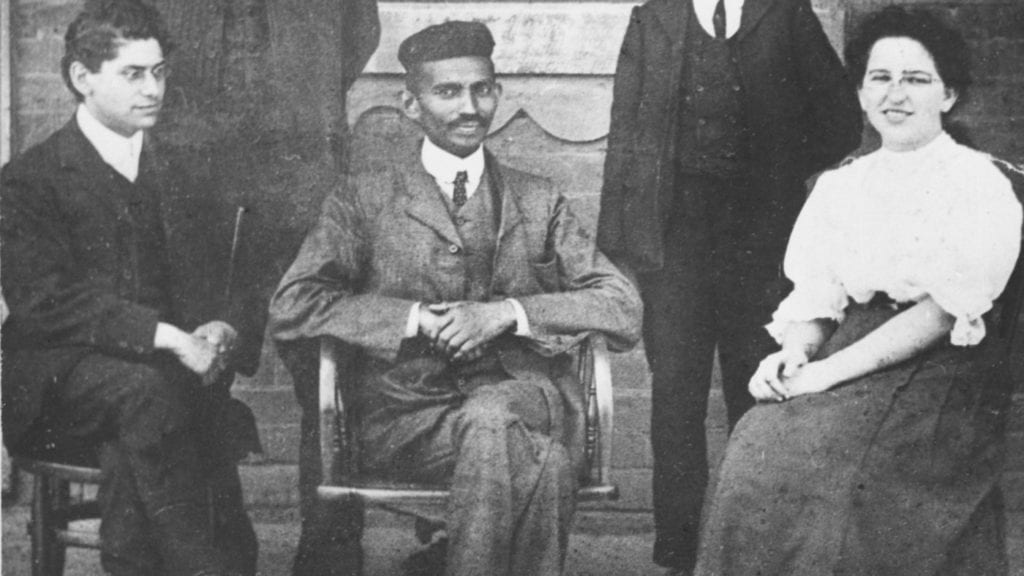
In 1893, Gandhi traveled to South Africa. He was there to fight for the rights of Indian expats, but while he was there, he made a few statements about Africans that seem incredibly shocking today.
Multiple books have been written about his time there, most calling him a “racist” – and not everything they say is a lie. Gandhi said that Africans are “troublesome, very dirty, and live like animals”; he called them “savages”, and repeatedly used the racist term “kaffirs”.
It’s true — Gandhi, as a young man, could be called “racist”. But criticizing Gandhi for his time in South Africa is like criticizing the Apostle Paul for his time as Saul. Gandhi grew up. He changed.
Later in life, Gandhi started calling for “an awakening in South Africa” – meaning a revolution for African rights. He ordered his followers, when they went to South Africa, to live under the same restrictions the black population endured to make sure they knew how they suffered. And he openly mocked the idea of the “noble savage”, saying, “They are certainly noble, but no savages.”
When the revolution Gandhi called for came to fruition, the man at its head, Nelson Mandela, specifically cited Gandhi as part of the influence behind Africa’s freedom, saying:
“Gandhi must be forgiven those prejudices and judged in the context of the time and circumstances. We are looking here at the young Gandhi, still to become Mahatma, when he was without any human prejudice save that in favor of truth and justice.”
9 Gandhi Supported The Caste System
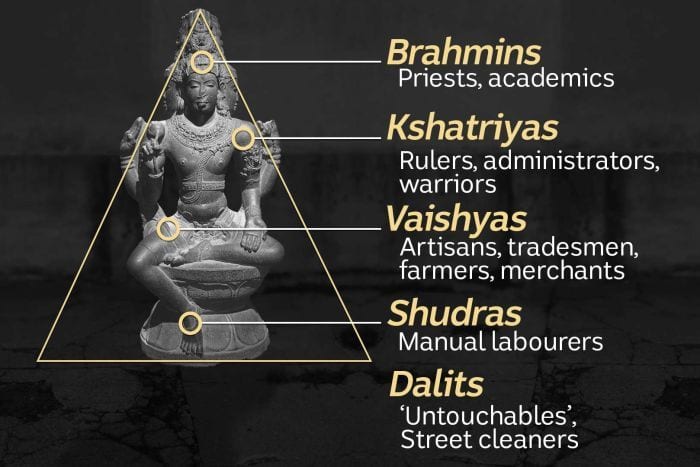
Author Arundhati Roy wrote a whole book criticizing what she called “The Gandhi Myth”. “It is time to unveil a few truths,” she said, before accusing Gandhi of supporting the caste system.
The caste system is an ancient belief that humanity is divided into five separate castes. Priests and teachers, it says, are the top of humanity. At the bottom are the so-called “untouchables” – people like street sweepers and latrine cleaners, considered the bottom of humanity.
It’s one of the strangest things you could possibly accuse Gandhi of supporting. His stance on caste was unambiguous. In fact, in 1932, he went on hunger strike specifically to protest the caste system.
Like most of the accusations against Gandhi, there’s a tiny, out-of-context kernel of truth in this one. Gandhi was a Hindu and he believed, on religious grounds, that people were born in certain castes.
But he believed everyone had the right to move up in life and strictly opposed discrimination, saying it was “against the spirit of religion”.
“This religion, if it can be called such, stinks in my nostrils,” Gandhi said about the caste system. “This certainly cannot be the Hindu religion.”
8 Gandhi Left His Father’s Deathbed For Sex

One Gandhi story that people love to work into listicles is the moment he left his father’s deathbed to have sex.
It’s a true story – in fact, it comes from Gandhi himself. When he was 16, Gandhi left his father’s bedside, caught in what he called the “grip of lust”, and spent the night with his wife, Kasturba. While he was gone, he missed his father’s final breath.
It’s a juicy story, but only really because Gandhi tells it that way. To him, this was the life-changing moment that taught him the evils of sexual desire. He believed that sexual lust had ruined his life and, because of this moment, swore never to touch wine, meat or women again. After his father’s death, Gandhi swore to only have sex to procreate.
Like the stories about South Africa, this is part of Gandhi’s origin story. Is a moment he regretted and a part of what made him the man he would become.
But even as an origin story, this one is really just Gandhi beating himself up for nothing. If anyone less puritanical about sex told the story, it would be as bland as bland could be. All that really happened is that Gandhi sat by his father’s side while he was dying and, went nightfall came, stepped away for a moment to see his wife.
It was Gandhi himself who turned this into a story into sinister, depraved lust. If anything, his take on the story is just proof of how hard the man could be on himself.
7 Gandhi Slept Nude With His Teenaged Great-Niece
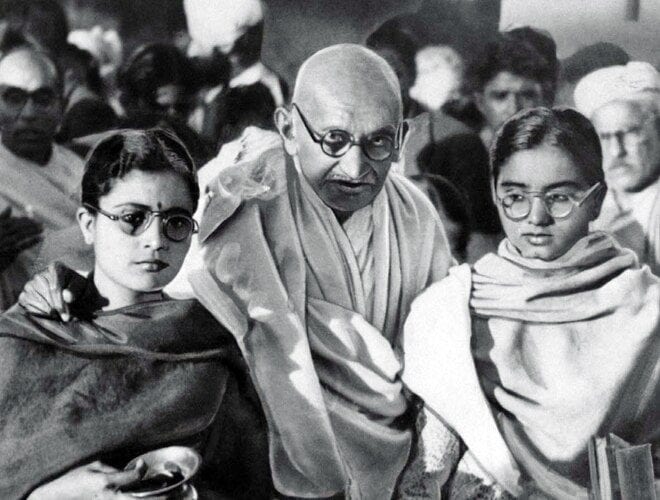
One of the hardest things to accept about Gandhi is his views on sex. Missing his father’s death took a toll on him, and he manifested that guilt into a complete and total rejection of sexuality. And, in a lot of ways, that resulted in some strange behavior.
In his later years, Gandhi started performing “purity tests”. He wanted to completely conquer his sexual desires, saying he wanted to “become a eunuch mentally”, and so he had women – including his own great-niece – sleep naked in the same bed as him to test his willpower.
Ok – admittedly, that one’s a bit weird.
It wasn’t just a part of Indian culture, it was just a weird thing that Gandhi did. A lot of people have suggested it proves he’s a pervert, and it’s pretty reasonable to assume that – at the very least, on a subconscious level – this was a subtle sign of how much Gandhi was struggling with his vow of chastity.
There’s no proof whatsoever, though, that Gandhi ever touched anyone in an inappropriate way.
Nobody has ever come forward saying Gandhi touched them. Sushila Nayar, one of the women Gandhi is most often accused of touching, has said she only slept with him “as I would with my mother”. Likewise, his great-niece Manu described it as being like put to bed “with great love”, as if by a mother.
And Gandhi never hid it. When he found out that people thought it was strange, he made it a point to talk openly about it, wanting to make sure that he wasn’t hiding anything he did.
6 Gandhi Called Hitler His “Friend”
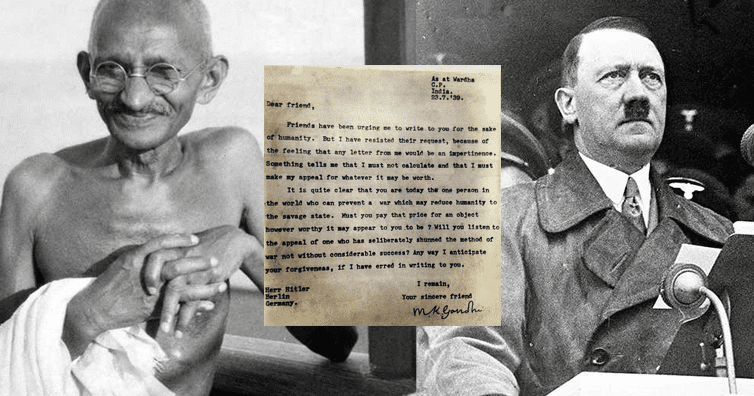
Writer Joseph Lelyveld wrote a whole book criticizing Gandhi. He advertised it as “catalogs of Gandhi’s hypocrisy”, setting out to prove that Gandhi was a monster. Among his evidence was the juicy, often-repeated fact that Gandhi called Hitler his “friend”.
It’s a perfect example of just how twisted the facts can become when you take them out of context.
It’s true that Gandhi wrote a letter to Hitler that opened with the words “Dear friend” – but if Lelyveld had literally just read the one more word in the letter, he’d have realized there’s nothing scandalous about it at all.
The letter is a call for peace, which says:
“You are today the one person in the world who can prevent a war which may reduce humanity to the savage state. Must you pay that price for an object however worthy it may appear to you to be? Will you listen to the appeal of one who has deliberately shunned the method of war not without considerable success?”
Gandhi is polite, and he tries to flatter Hitler at every opportunity – but that’s just because he was trying to be persuasive. He only ever called Hitler a “friend” when he was trying to convince him to put an end to the Second World War.
5 Gandhi Told The Jews To Kill Themselves

“The Jews should have offered themselves to the butcher’s knife,” Gandhi once said. “They should have thrown themselves into the sea from cliffs.”
It’s a pretty shocking quote – and so it’s not surprising that it’s been used to defame Gandhi more than once. But in context, it’s not as crazy as it seems.
Gandhi had some strongly-held, unusual beliefs. He was happy to die for a cause. During one of his many fasts-to-death, he openly embraced his imminent death, saying: “This is a god-given opportunity that has come to me, to offer my life as a final sacrifice to the downtrodden.”
And above all, he believed in pacifism in all circumstances, even when someone was ready to kill you. In 1908, he was horribly beaten and left for dead. He didn’t defend himself – and afterward, he asked people to forgive his attackers.
And he held his followers to the same standards. When the Indian people started rioting in response to a British massacre, Gandhi declared a fast-to-death, saying that he wouldn’t eat until his countrymen stopped using violent methods.
It might sound crazy when you apply it to the Holocaust – but Gandhi believed that non-violence was a universal virtue, no matter how dire the circumstance. The only hope for a better world was to refuse to respond to violence with violence, no matter how terrible the enemy. As he put it:
“Every truth—if it really is truth—presents itself as universal, even if it is not the whole truth. If something is true, then it must be true for all people and at all times.”
4 Gandhi Told Britain To Surrender To The Nazis
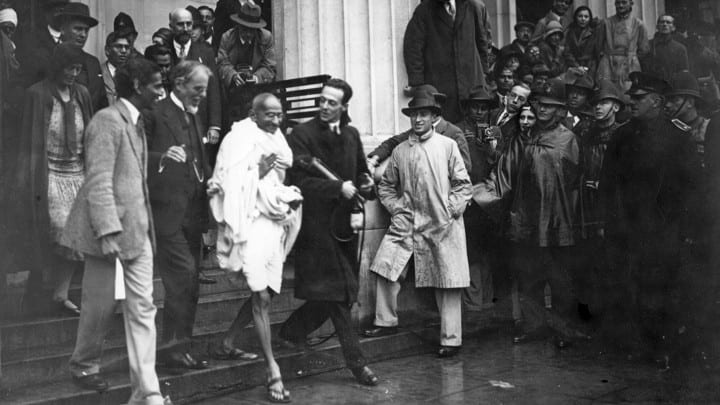
In the book “Lies, Damned Lies, and History”, Graeme Donald says that our appreciation of Gandhi is a “form of self-delusion.” His sainthood, he argues, is a “myth he so cleverly wove for himself”. And then he proves it by quoting Gandhi on saying: “I do not consider Hitler to be as bad as he is depicted.”
Combined with that letter where he called Hitler his “friend”, it’s all perfect fodder to make Gandhi sound like a Nazi-supporter – but that couldn’t possibly be further from the truth. Gandhi was simply against war in all forms, and this was part of his call to end World War II peacefully.
In it, he admitted that Hitler was the worst enemy the world had ever faced, saying:
“If there ever could be a justifiable war in the name of and for humanity, a war against Germany, to prevent the wanton persecution of a whole race, would be completely justified.”
Gandhi, however, strictly believed that no war was ever worth fighting. He wanted the Allies to “fight Nazism without arms”, saying that winning through weaponry would stop an enemy but condemn humanity. The only hope for a better future, he believed, was to show a monk-like refusal to fight.
It wasn’t exactly practical advice, but the bombing of Hiroshima and Nagasaki—while not necessarily proving Gandhi right—certainly help us understand what Gandhi was trying to say. He didn’t care who won the war. He cared about what became of humanity when the fighting was finished.
3 Gandhi Told His Own Son He Was Better Off Dead
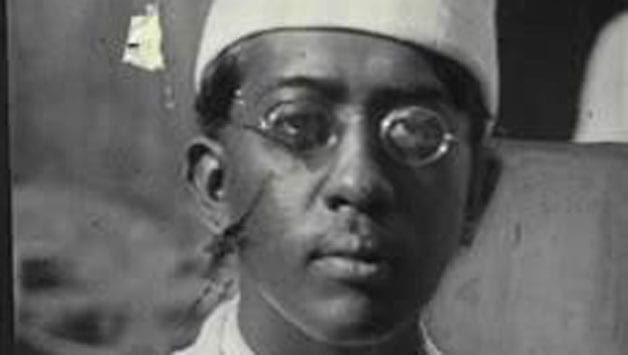
There’s a whole movie about Gandhi’s complicated relationship with his son, Harilal. It’s called “Gandhi, My Father”, and the producers advertise it as “a story about a clash of principles.”
It’s true – Gandhi and his son didn’t always see eye-to-eye. Gandhi did kick his son out and it was, in a way, a clash of principles. This wasn’t a little squabble over nothing, though – Gandhi’s son had raped his own seven-year-old daughter.
Harilal’s violent sexual assault on his own child was so brutal that she had to be rushed to the hospital. That was why Gandhi and his son didn’t get along – because Harilal had violently, incestually raped a seven-year-old child.
Gandhi continued to write his son regardless. One of his letters begged his son to lay off alcohol, including a line that’s been repeated a few times since:
“I wish that you would rather die than resort to alcohol.”
That’s another line that used against him – and, yes, Gandhi did tell his son he was better off dead than drunk. But this was a letter written to a man who, when he got drunk, raped children.
Gandhi can probably be forgiven for getting a bit emotional.
2 Gandhi Let His Supporters Rot In Prison
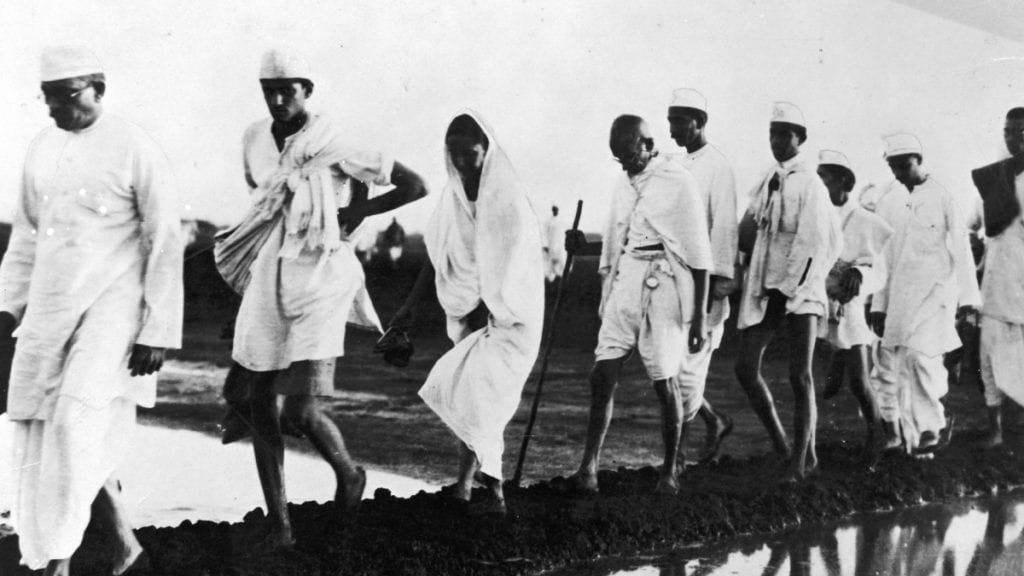
Author Andrew Roberts wrote a 2,000-word essay tearing Gandhi apart, above all for leaving his supporters to rot in jail, saying:
“Between 1900 and 1922, Gandhi suspended his efforts no fewer than three times, leaving in the lurch more than 15,000 supporters who had gone to jail for the cause.”
It certainly makes Gandhi sound like a selfish, neglectful man driven by his own callous whims – but nothing could be further from the truth.
Every one of Gandhi’s supporters knew that they were risking prison. Gandhi openly and bluntly warned people that prison was looming, telling them: “It takes courage to resist and not strike back. It takes courage to risk going to jail.”
It was actually part of Gandhi’s plan. Every time Britain jailed an Indian, they lost a worker and lost profits. If enough people went to prison, Gandhi believed, Britain would realize they had no choice but to negotiate.
And Gandhi didn’t just suspend his protests for no reason – he did it to stop his followers from using violence. When Gandhi suspended the movement in 1922, for example, it was because his followers had burned down a police station with 22 people inside.
Gandhi wanted to liberate India – but he wasn’t willing to let people die. Every time his own followers became violent, he’d force them back on the path of peace.
1 Gandhi Refused To Let Doctors Save His Wife’s Life
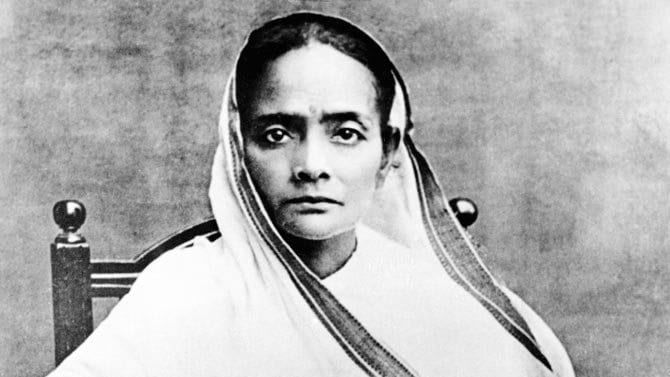
“The truth about Gandhi,” says Harvard University’s paper, The Crimson, is that he let his own wife, Kasturba, die. As they explain it:
“British doctors told her husband that a shot of penicillin would heal her; nevertheless, Gandhi refused to have alien medicine injected into her body, and she died.”
They’re hardly the first people to spread this story. It’s a popular one – and one that’s completely untrue.
Yes, Gandhi didn’t let the doctors give his wife penicillin – but it wasn’t because it was foreign. It was because the penicillin used animal products, and his wife was strictly vegetarian.
It might seem trivial to a Western audience, but to Gandhi and Kasturba, it was essentially a decision between protecting her body and protecting her soul. To them, the soul was simply more important – and even then, her death tore Gandhi up. Gandhi spent the rest of his life struggling with the decision, repeatedly wrestling with the question of whether or not he’d done the right thing.
He’s also been called a hypocrite, because, later in life, he took quinine – another Western medicine – to treat his own illnesses. But the quinine he took was an orally-ingested medicine from tree bark, without any animal by-products.
His value system might be hard to understand – and that’s why it’s so easy to paint him as a villain. But Gandhi wasn’t some monster. He was just a man from a different culture, whose beliefs were different from our own.
But of all those beliefs, the one he valued the most was his belief in peace. And that made him a great man.
For more lists like this, check out 10 Times People Erected Public Monuments To Their Enemies, and 10 People Who Claim To Be Reincarnations Of Other People








